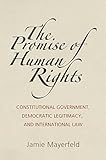The Promise of Human Rights : Constitutional Government, Democratic Legitimacy, and International Law / Jamie Mayerfeld.
Material type: TextSeries: Pennsylvania Studies in Human RightsPublisher: Philadelphia : University of Pennsylvania Press, [2016]Copyright date: ©2016Description: 1 online resource (320 p.)Content type:
TextSeries: Pennsylvania Studies in Human RightsPublisher: Philadelphia : University of Pennsylvania Press, [2016]Copyright date: ©2016Description: 1 online resource (320 p.)Content type: - 9780812224580
- 9780812292800
- online - DeGruyter
- Issued also in print.
| Item type | Current library | Call number | URL | Status | Notes | Barcode | |
|---|---|---|---|---|---|---|---|
 eBook
eBook
|
Biblioteca "Angelicum" Pont. Univ. S.Tommaso d'Aquino Nuvola online | online - DeGruyter (Browse shelf(Opens below)) | Online access | Not for loan (Accesso limitato) | Accesso per gli utenti autorizzati / Access for authorized users | (dgr)9780812292800 |
Frontmatter -- Contents -- Introduction -- Chapter 1. Human Rights -- Chapter 2. Madison's Compound Republic and the Logic of Checks and Balances -- Chapter 3. Europe and the Virtues of International Constitutionalism -- Chapter 4. American Exceptionalism and the Betrayal of Human Rights, Part I: The Torture Memos -- Chapter 5. American Exceptionalism and the Betrayal of Human Rights, Part II: Enabling Torture -- Chapter 6. The Democratic Legitimacy of International Human Rights Law -- Conclusion -- Notes -- Index -- Acknowledgments
restricted access online access with authorization star
http://purl.org/coar/access_right/c_16ec
International human rights law is often criticized as an infringement of constitutional democracy. In The Promise of Human Rights, Jamie Mayerfeld argues to the contrary that international human rights law provides a necessary extension of checks and balances and therefore completes the domestic constitutional order. In today's world, constitutional democracy is best understood as a cooperative project enlisting both domestic and international guardians to strengthen the protection of human rights. Reasons to support this view may be found in the political philosophy of James Madison, the principal architect of the U.S. Constitution.The Promise of Human Rights presents sustained theoretical discussions of human rights, constitutionalism, democracy, and sovereignty, along with an extended case study of divergent transatlantic approaches to human rights. Mayerfeld shows that the embrace of international human rights law has inhibited human rights violations in Europe whereas its marginalization has facilitated human rights violations in the United States. A longstanding policy of "American exceptionalism" was a major contributing factor to the Bush administration's use of torture after 9/11.Mounting a combination of theoretical and empirical arguments, Mayerfeld concludes that countries genuinely committed to constitutional democracy should incorporate international human rights law into their domestic legal system and accept international oversight of their human rights practices.
Issued also in print.
Mode of access: Internet via World Wide Web.
In English.
Description based on online resource; title from PDF title page (publisher's Web site, viewed 30. Aug 2021)


